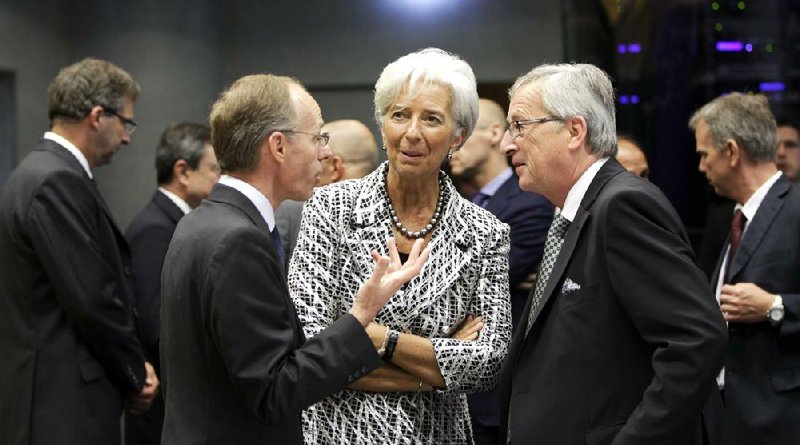LUXEMBOURG — Finance ministers from the countries that use the embattled euro debated Thursday the best way to help Spain bail out its banks and whether to give Greece’s new government more time to get its deficit under control.
With fears the currency itself is now on the line,the 17 ministers gathered in Luxembourg will also try to make progress on an array of measures to resolve the debt crisis as they prepare for a summit meeting of European leaders in Brussels on Thursday and next Friday. And the leaders of the biggest four eurozone economies - Germany, France, Italy and Spain - will meet today in Rome.
Among the most pressing issues is a bailout for Spain’sbanks, though Spain’s economy minister Luis de Guindos said on arrival that Spain is not ready to make a formal request yet.
The Spanish government said Thursday evening an audit has put banks’ funding needs at $64.79 billion to $78.76 billion. Euro-member governments have already said they would be willing to lend Spain up to $125 billionthrough one of its two bailout funds.
But markets and investors are anxious to hear the exact terms, so they can judge the effect on Spain’s national debt. The Spanish government’s debt seems destined to rise as a result of the bank bailout. Because of that, the government’s cost of borrowing has increased, leading some observers to think the country itself will need a bailout.
Irish Finance Minister Michael Noonan said the uncertainty is roiling markets.
“While there’s no request, and while there’s no certainty about the amount being requested, I think that makes the market jittery,” Noonan said on his way into Thursday’s meeting.
The eurozone finance ministers are also weighing Greece’s request for more time to reach its budget-balancing targets. The country’s new prime minister, Antonis Samaras, has said his coalition would respect the outlines ofthe country’s bailout terms, but has added that the current targets are not realistic. European Union officials in Brussels have indicated the country needs more time, though Germany has opposed any softening in the terms, which were attached to bailout loans made to Greece.
On Thursday, the Dutch and Finnish ministers dismissed the idea of giving Greece extra time.
“I don’t think it’s a good idea,” said Finland’s Jutta Urpilainen, arriving at the meeting.
But if Greece is not granted more time and fails to meet the targets, the EU, the European Central Bank and the International Monetary Fund will have to decide whether to withhold further funding - a move that would force the country to default on its debtsagain - and probably leave the eurozone, with consequences that could reverberate around the world.
Also, the finance ministers will discuss new measures to ease the financial chaos roiling European countries, particularly the high borrowing rates of Spain and Italy.
During the last 2 1/2 years of Europe’s government debt crisis, Greece, Ireland and Portugal have sought and received multibillion-euro bailouts when high borrowing costs made it impossible for them to finance their debts on the international bond markets. Now markets-watchers fear Spain and Italy may soon be joining their ranks.
The leaders of the 17 countries that use the euro have been under global pressure to find a comprehensive solution to the debt crisis rather than continuing to take piecemeal measures that provide only temporary relief. At this week’s G-20 summit of world economic powers in Los Cabos, Mexico, politicians including U.S. President Barack Obama called on Europe to do what was necessary.
Business, Pages 21 on 06/22/2012

